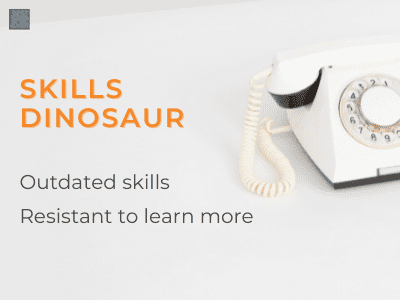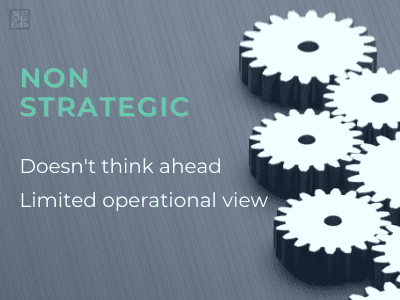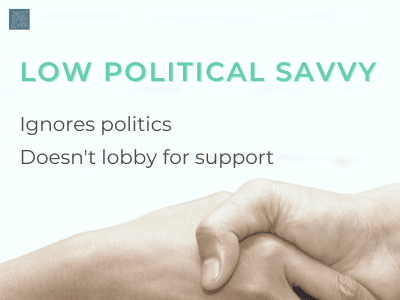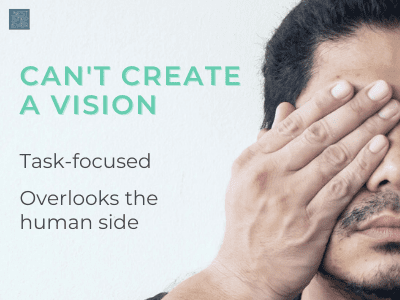Expand your talent pool by growing your existing staff. Solve staffing and retention problems, fast!
Staff development for your internal talent will build a strong talent pool.....
Is your organization being held back because your internal talent pool is too small? Are you having to look externally for talented staff because your staff are unpromotable?
And how’s that working out for you? Not too good, I guess. Seeing too much competition in the job market and too few applicants? Others offering way more benefits and perks than your organization is willing to provide?
The labour market is tough and likely to get even tougher. Too much demand and not enough supply.
Well, the answer may be in plain sight.
Imagine if you could turn 10% of your existing staff into high potentials.
Well, you can.
So many staff are capable of much more but there’s something holding them back. One or more weaknesses that they may not be aware of, but that have a big impact on their future career.
Firstly, you need to create insight to identify the career stallers. And then you need to provide training and coaching to help staff overcome these obstacles. Once the barriers are removed, your staff can reach their full potential. With enormous benefit to both themselves and the organization.
Worth a try?
THE 12 BIGGEST REASONS WHY CAREERS DERAIL
For over 25 years I've been responsible for hiring, firing, promoting and coaching people at senior levels across two continents. In my experience there are twelve major reasons that stand out as occurring most often.
I’ve split these career stallers into progressive categories. Technical, Personal, Interpersonal, and Strategic. If someone’s shortcomings are happening in the first category, it’s unlikely they’ll able to progress to the next level, and so on. So, these career walls need to be addressed in sequence.
Let’s unpack these twelve career stallers and look at how to address them.
TECHNICAL DEFICITS
Technical skills relate to the ability to perform practical tasks in a specific functional area. For example, an accountant, or a graphic designer. When these skills are too narrow, or become dated, then the staff member becomes less valued.
Let’s unpack three technical deficits that can stop careers dead in their tracks.
1. One-trick pony
The problem:
We all know that employee who is highly competent in a very narrow area. All that very specific knowledge makes them valuable but not very promotable. Because we only ever picture them in that specific role (like a pony with only one trick). It’s like putting them in a box from which they can’t escape – because their skills base is very deep and narrow.

The fix:
If this employee wants to contribute more, how can we help them to broaden their scope?
Chances are this highly technical employee is not very able in meta skills such as communication, persuasion, and teamwork. Providing specific soft skills training will enable them to explore expanded roles and responsibilities which build on their core technical skill. For example, becoming a technical trainer or mentor will enable them to pass on their unique specialized knowledge to others.
2. Skills dinosaur
The problem:
The skills dinosaur is in danger of becoming redundant because their current skills base is outdated.
Chances are strong however that the skills dinosaur dislikes change. They are resistant to updating core technical skills or learning new ones.
There are obvious skills that are becoming obsolete. Such as bank teller, cashier, mail carrier, insurance underwriter, secretary, printing press operator.
Other professions are rapidly evolving, primarily due to changing technology. For example, diagnostics using artificial intelligence generally outperform diagnostics made by medical specialists. Even those specialists with many years of experience. Medical professionals face a stark choice. Become more efficient and effective by embracing the technology, or fight to keep it out of your practice - and get overtaken by others.
Most professions face similar challenges.

The fix:
Ensure employees are receptive to change before you offer any upskilling opportunities. This needs education (“here is why you need to keep updating your skills”), support (“here is how we can help you”) and positive reinforcement.
Once there is a positive mindset towards change, then the organization can sell the benefits of upskilling. Like staying relevant. Increasing employability. Opening up new career paths.
3. Tech block
The problem:
This employee isn’t interested in, and doesn’t want to learn, new technologies aimed at making life easier. Probably they’re fearful or overwhelmed. However, they tend to brush off their gaps with phrases like “that’s not really my thing”; “it’s Greek to me”, or “it’s all going to change again anyway”.
We can’t get away from using the ever-changing technical platforms if we want to be effective in the workplace. Employees who don’t want to learn to use new tech solutions risk becoming part of the problem. And they don’t inspire confidence in their ability to navigate new paths.

The fix:
Work on the assumption that the resistance is based on fear of looking ignorant and incompetent. Consider how to create a supportive environment. One which accepts that people learn at different paces. Build in repetition and practice sessions with an encouraging trainer.
Once the employee sees the benefits of the new technology (perhaps speed, or efficiency, or convenience) they are far more likely to adopt it. And lots of encouragement and affirmation to acknowledge their resilience makes the journey so much easier.
PERSONAL SHORTCOMINGS
Three specific weaknesses frequently trip up employees. They’re not even aware of most of them.
However, they’re not too difficult to fix. But first, the employee needs to get personal insight into their gaps. Only then will they understand that they need to put effort into doing things differently. To get better results.
4. Poor personal planning skills
Poor time management skills don’t do anyone any favours.
What kind of impression does an employee create if they can't be on time for a meeting, virtual or otherwise? With the right documents on hand. And a well thought out contribution to provide.
Let’s also add that it’s deeply disrespectful to others.
If an employee can’t manage their own desk, they’re not likely to be entrusted with more resources or bigger budgets.
Only a very few geniuses can get away with chronic disorganization. For the rest, it’s a one-way trip to mediocrity and being overlooked.

The fix:
The fix here is not to jump into providing time management training or tools.
Because the underlying issue is about a mindset that is tripping the person up. What prevents them from setting time aside to plan and prepare? What prevents them from being ready and waiting prior to the start of the meeting?
So, what can we do to get a mindset change going?
As a pre-curser to a time management workshop, set the stage. Participants should consider the following:
- What is the cost of being disorganized? (e.g. lost opportunities, time wasted, increased costs)
- What self-limiting beliefs are preventing change from happening?
- How to change the internal script to reduce these negative beliefs?
- What are the benefits of being more organized (e.g. less stress, more control, more time)
- What would a typical day look like if life was more organized?
Only once deep insight has been gained is it time to look at providing tips and techniques for a more streamlined life.
5. Lack of honest self-promotion
Perhaps you’ve spotted some employees who make powerful contributions but tend to stay in the background. They’re reluctant to take credit. As a result, they often get underestimated and overlooked.

The fix:
A two-fold approach is needed here.
Firstly, these employees need encouragement and acknowledgement. Conscious efforts should be made to bring them to the foreground to get the credit they deserve.
Here’s what these staff need to hear:
“There's nothing wrong with beating your own drum. In fact, it's essential if you want others to know about your achievements. They're unlikely to spend time trying to uncover your hidden talents and accomplishments. Make your talents more obvious!”.
Secondly, they need to be encouraged to change their script. They need to start referring to their achievements.
They need to practice using phrases such as:
- "I feel pleased that I was able to fix xyz";
- "Were you satisfied with my solution to xyz?";
- "I"m not sure if you are aware but I have experience in xyz which can help with abc", etc.
They may also need help to prepare their own scripts to highlight what they did and what the result was. So that it’s ready to be used when the opportunity arises. These employees can benefit enormously from coaching to support their behaviour change.
6. Poor composure
Every organization has them. People whose emotions are a little too close to the surface. They easily get heated, frustrated, or defensive. And that’s a sure career staller.
Emotional expression is well received when it’s being expressed positively. It’s a showstopper if negative feelings are being emoted. These people are often viewed as unobjective, difficult to work with, negative and volatile.
The fix:
The triggers for poor composure are many and diverse. To fix this specific career staller, a highly individual approach is needed.
The best way forward is to enlist the help of a coach or health professional to help the employee uncover their triggers. Once they’ve done that, they’re in a better position to learn to address them. Some of the most dramatic career turnarounds happen when people with poor composure learn to manage their emotions constructively.

INTERPERSONAL GAPS
People with sound interpersonal skills go places faster. Getting ahead in a corporate career depends upon building strong reciprocal relationships. And that’s not just something for the extraverts.
It’s definitely possible to build strong relationship skills in staff. It takes awareness, insight and guidance.
Here are three top interpersonal deficits that stop careers in their tracks.
7. Can't read the room
Perhaps you have a star employee. Their task motivation and delivery are exceptional.
Problem is, they don’t tune into the underlying feelings and motives of others. They seem to be oblivious that some-one else has a different agenda or a different perspective. So, they’re not very effective in navigating and removing barriers. Because they don’t anticipate them in the first place.

The fix:
Chances are that the person who can’t read the room is making assumptions. They’re assuming that others see things their way.
They need help to see things from a different perspective. Using a personality profile or behavioural framework can be useful in this instant. Some form of training that helps them gain insight into how we differ in motivation, behavioural preferences, and stress responses.
Once they get a framework to analyse the personal preferences and approaches of others, you’ll find that they’re more able to see things from the other point of view. And to moderate their own approach to become more effective.
You’ll need to create insight, and then follow this up with support and encouragement. Having an employee who is not just super-competent but also able to modify their interpersonal approach makes them doubly valuable. It’s definitely worth the time investment.
8. Can't work well with and through others
Staff who are unable to work well in teams or with others run the risk of being regarded as the Lone Ranger and being left in a corner.
A common reason for not working well with others is having a mono-view. They view other people through the lens of their own personality and preferences. They are unable to understand why others don't see or do things the way you do.

The fix:
There is no easy fix for this. Enrol employees like this in a program which gives insight into different behavioural styles and how best to adapt to others. Encourage them to take small steps to do things differently and co-operate in harmony with others.
Expect to work on this skill for many months to see measurable progress. Active coaching and mentoring are needed to get the employee to make permanent behavioural changes. And to see the benefits of these changes.
9. Can't delegate
An employee who is unable to delegate activities to others or let them get on with the tasks unhindered will only ever be able to manage their own workload. They are unlikely to get bigger responsibilities. Or extra people resources.
They’ll have plenty of excuses, like “Others don’t do it the right way”, or “I can do it myself faster in the time that it takes to teach some-one else to do it”. However, they need to get insight that they’re never going to be considered for higher responsibilities or team leadership if they don’t learn to let go and delegate.

The fix:
An employee who is reluctant to delegate needs to see personal benefit before they start letting go. They’ll also need support because they’re being asked to relinquish control.
They need help to understand that delegation is a key skill in getting more done in a shorter space of time. Encourage them to delegate small tasks and once they’ve mastered that move to larger ones.
Explain the tight-loose-tight structure: Be very specific (tight) in what the outcome and deadline of the delegated task should be. Then (here's the loose part) let the person get on with it without interfering. And finally be tight when evaluating the end result against clearly defined expectations.
BLIND TO THE BIGGER PICTURE
The following three career stallers are big hurdles. They’re about having a macro view of organizational dynamics and relationships. And not everyone is able to develop the vision and context to deal with barriers of this nature.
10. Non-strategic
Employees who are non-strategic tend to have a narrow operational view. They’re not bigger picture thinkers.
They’re not good at anticipating events or reactions.
They focus on short, rather than long, time horizons.
They struggle to think across different functions to get results.
When asked for a contribution, they tend to refer to daily operational matters rather than future-oriented solutions.

The fix:
First, you’ll need to feel out if the employee in question has the ability to cultivate a strategic mindset. Provide them with information and exposure to broaden their horizons. Encourage them to research and read widely.
Also encourage them to cultivate a CEO mindset. Ask them to envisage the lens through which a senior manager views the world. What are their concerns? What keeps them awake at night? What are their long-term goals? What do they read? Regarding the industry, what are the challenges and opportunities? How will this change in the years ahead?
These are the questions that you need to encourage them to think about. Debate their responses with them.
If they take to the task with enthusiasm, then there’s lots of potential for them to develop their strategic perspective. If they’re resistant to adopting a wider view, you may need to admit defeat.
11. Low political savvy
Most of us dislike office politics and try to stay out of it. Problem is, we can’t ignore that it happens, and we ignore it at our peril. That’s not to say we want to be feeding such politics. However, having political savvy means that we understand the prevailing power politics and are able to navigate them positively without being sucked into them.
When an employee is completely oblivious of such politics, or declares an intense aversion to them, this limits their effectiveness.

The fix:
Here’s what a smart employee can be encouraged to do to develop political savvy:
- Discover who the real decision-makers are and who influences them.
- Learn smart compromises (don't attack the CEO's pet project unless you have a death wish, for example) and focus on what's important.
- Understand who wields power responsibly and provide them with support.
- Learn to spot power games and stay on the right side of them in a way that is congruent with their own integrity and value system.
12. Can't create a compelling vision
Picture this problem. You have a very capable employee who has been given a strong team to lead. The problem is that this team leader is very task focused. They ignore the human element. As a result, the team is not excited or stimulated by their leader. The performance of the team is not as strong as it could be.
Inspiring leaders create followers. One way they do this is by describing a picture of an exciting and credible future to others. The vision should be compelling enough that others desire to achieve the vision. If you are unable to create a compelling vision, why should others follow you?

The fix:
Encourage the team leader to create a compelling vision for themself. What will success look like and how will it feel?
Now encourage them to think about a vision that could be broader than just themself. How could the team leader incorporate the ideas of others to build an achievable vision everyone gets excited by?
This compelling vision should stay top of mind and be used to guide the team onwards and upwards.
NEXT STEP TOWARDS STAFF DEVELOPMENT
If you could select 10% of your staff that are currently held back by career barriers, who would you choose?
And how much more effective could they be if you helped them to overcome these blocks?
You could very quickly increase your internal talent pool by growing your existing staff. It takes some effort. However, the payback may be enormous.
BestStepEver's 90 day roadmap addresses these and many more career stallers. Upon completion of the roadmap, members have deep insight into themselves and own a toolbox of skills to increase their effectiveness and boost their careers.


